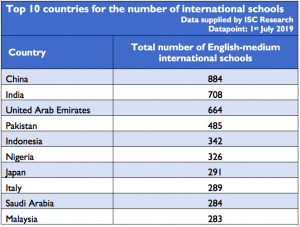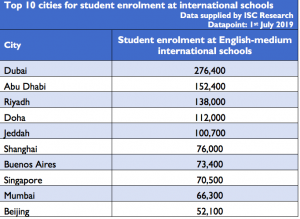English-medium international schools enrol 5.6 million children around the world – up from 969,000 in 2000 – and all signs point to sustained global growth for the sector, the latest report by ISC Research has revealed.
News and business analysis for Professionals in International Education
Have some pie!
Sustained growth for the international schools’ sector – ISC
 Demand is particularly high in Asia, but the research has highlighted several countries where significant growth is expected over the next few years. Photo: greymatters/Pixabay
Demand is particularly high in Asia, but the research has highlighted several countries where significant growth is expected over the next few years. Photo: greymatters/Pixabay
Additionally, the number of international schools has increased more than fourfold in the period from 2000 to 2019, up from 2,584 to 10,937, the report showed.
“A few countries have a serious shortfall, particularly China and Hong Kong”
Demand is particularly high in Asia, but the research has highlighted several countries where significant growth is expected over the next few years.
“International school development in most countries is expanding at sufficient pace to satisfy the increasing demand for places, but a few countries have a serious shortfall, particularly China and Hong Kong,” Richard Gaskell, ISC Research schools director, told The PIE News.
“There are several countries where, in the near future, demand is expected to grow beyond current capacity.
“These include Malaysia, Vietnam, Japan, Saudi Arabia, Qatar and The Netherlands. All signs suggest that the rate of global growth of international schools will continue,” he added.
In Eastern Asia, enrolments have risen by 7.4% in the four years from January 2015 to 2019, increasing from 452,400 students to 600,900.
In South-Eastern Asia figures show a 5.7% growth, from 394,100 students in 2015 to 492,300 this year.
Enrolments in Western Asia – which ISC defined as the Middle East including Egypt, has grown from 1,334,100 to 1,597,200 over the same period.
The report suggested that over the next decade, the number of enrolments will reach 2.5 million in Western Asia, over a million in Eastern Asia and 851,000 in South-Eastern Asia.
In China, international schools for Chinese locals, which are separate from those for expatriate children, have experienced the fastest growth – 359,300 children in China attended the 884 international schools in the country, and 66% of them were Chinese nationals.
Several countries are expected to see significant growth in the near future, according to the research.
All signs suggest that the rate of global growth of international schools will continue
On the list of the countries to watch, Saudi Arabia looks promising thanks to education becoming an emerging sector for foreign investment, while Qatar’s National Vision for 2030 could boost demand for international education in the country.
However, in Malaysia, the research shows, the current international school provision is not keeping up with the pace of industrial and residential growth in certain areas.
Legislation changes in Vietnam and Japan are expected to favour the international schools’ sector. While in Vietnam international schools will be able to enrol more students thanks to the raised enrolment cap, in Japan new immigration laws and market confidence are encouraging more foreign workers to move in.
Many of the international schools in Japan, the report relayed, are experiencing excellent enrolment growth and more development “is likely”.
British independent schools currently dominate the market section of western independent schools with sister schools overseas.
At the end of the 2018/2019 academic year, 75 British independent schools were enrolling 44,000 students outside of the UK – a group generating US$1bn.
US and Australian independent schools are slowly catching up, and there is evidence that development is now increasing, the report explained.
Still looking? Find by category:




